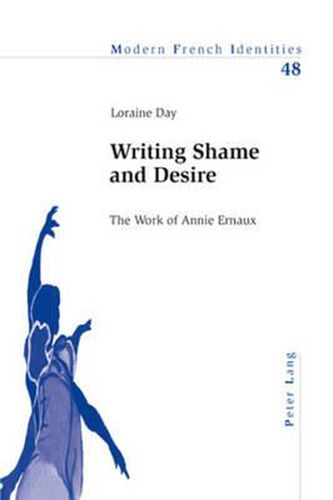Readings Newsletter
Become a Readings Member to make your shopping experience even easier.
Sign in or sign up for free!
You’re not far away from qualifying for FREE standard shipping within Australia
You’ve qualified for FREE standard shipping within Australia
The cart is loading…






The mature narrator of Annie Ernaux’s La Honte (1997) identifies her father’s assault on her mother, in June 1952, as the founding event in her awareness of self and social place, a bedrock memory that represents the one remaining link between the child she was and the woman she has become. As an adolescent, the protagonist is sexually repressed and socially humiliated, incapable of communicating her shame. As a mature woman, the narrator gives a frank account of the childhood mortification that is stamped into her psyche, and (in the concluding lines of the text) flags a later discovery that provides another locus for a sense of identity and continuity: orgasmic sexual pleasure.
This study combines psycho-social and literary perspectives to investigate the interdependency of shame and desire in Ernaux’s writing, arguing that shame implies desire and desire vulnerability to shame, and that the interplay between the two generates the energy for personal growth and creative endeavour. The book examines how Ernaux’s claim that her ‘autosociobiographical’ writing is a transpersonal activity that lays bare the mechanisms of social domination relates to her investment in writing not only as a means to explore lived experience, but also as an elemental expression of desire.
$9.00 standard shipping within Australia
FREE standard shipping within Australia for orders over $100.00
Express & International shipping calculated at checkout
The mature narrator of Annie Ernaux’s La Honte (1997) identifies her father’s assault on her mother, in June 1952, as the founding event in her awareness of self and social place, a bedrock memory that represents the one remaining link between the child she was and the woman she has become. As an adolescent, the protagonist is sexually repressed and socially humiliated, incapable of communicating her shame. As a mature woman, the narrator gives a frank account of the childhood mortification that is stamped into her psyche, and (in the concluding lines of the text) flags a later discovery that provides another locus for a sense of identity and continuity: orgasmic sexual pleasure.
This study combines psycho-social and literary perspectives to investigate the interdependency of shame and desire in Ernaux’s writing, arguing that shame implies desire and desire vulnerability to shame, and that the interplay between the two generates the energy for personal growth and creative endeavour. The book examines how Ernaux’s claim that her ‘autosociobiographical’ writing is a transpersonal activity that lays bare the mechanisms of social domination relates to her investment in writing not only as a means to explore lived experience, but also as an elemental expression of desire.